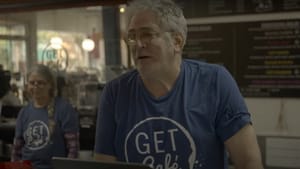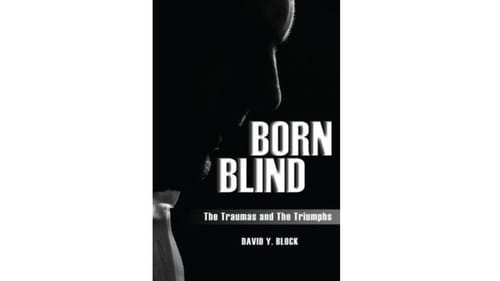Stay in the Loop
BSR publishes on a weekly schedule, with an email newsletter every Wednesday and Thursday morning. There’s no paywall, and subscribing is always free.
The life behind Born Blind
Blind filmmaker David Y. Block is finally telling his own story

For years, David Y. Block made short documentaries about other people’s struggles. How Sweet the Sound followed John Sutton, a blind man who, for decades, sang in the Suburban Station concourse, drawing appreciation and small change from passers-by. Who Said You Can’t Dance highlighted competitive wheelchair dancers. And Gift Horses showed how riding and grooming horses can be a balm for people with autism or those recovering from grief.
But Block, 61, a journalist and filmmaker who has been legally blind since birth, hadn’t written his own story. In Born Blind: The Traumas and The Triumphs, his recent self-published book, he takes one small step toward disclosure, sharing some personal experiences in the guise of fiction and one short memoir of his complicated father.
Attempting fiction was scary, Block said. He remembered the professors at Bard College who frankly said his writing was subpar, and the seminar with a published memoirist who agreed that his stories weren’t ready for prime time.
A storyteller’s education
But while making films about marginalized folks and people with disabilities, Block schooled himself, reading every book referenced in John Gardner’s classic The Art of Fiction: works by Chaucer and Shakespeare, George Bernard Shaw, and Edgar Allan Poe.
“[I had] fear that I wouldn’t be good, that my characters wouldn’t be believable, that nobody would read it, and I worried about how people would react to the story about my father,” Block says.
At the same time, he yearned to tell stories—albeit fictionalized—about people whose lives impressed or pained him. “Watch Me” is dedicated to Carlos Talbott, a blind Paralympic gold medalist who was struck by a car and killed during a 1994 training run in Florida.
“I was so disturbed about it,” Block recalls. “It was all I could think about for several months after Carlos was killed. He was a very determined, very fast runner. I had to write that story.”
He felt the same after traveling to South Carolina with Sutton the singer and members of the Pennsylvania Association of Blind Athletes; there, he learned that Sutton had been brutally abused by his mother during childhood, that he was unable to sign his name, and that his father often told him, “You can’t do nothing.”
“When I got back [from the trip], all I could do was cry,” Block says. “I wrote that story out of pain.”
A father-son journey
The most revealing piece in the book is the memoir “My Father … Me, and Sister Josefina”, which describes Block’s relationship with his father, a man who was at once critical and encouraging, relentless and distracted. He made copies of Block’s first check for a piece published in The New York Times and financially supported some of his films; he also expressed disappointment in Block’s career choice and berated him for his slowness and clumsiness.
Once, almost in passing, Block’s father acknowledged that he didn’t know how to parent a blind son. “He said he didn’t know how to be a good father to me,” Block recalls. “I liked that he opened up.”

The memoir details a father-and-son trip to the Philippines to see a faith healer, Sister Josefina, in hopes that she might improve Block’s vision. It didn’t work. And the trip included a humiliating evening when Block’s father phoned a massage parlor and ordered two women to visit their room for sex.
In the piece, Block acknowledges that his father experienced his own harsh upbringing with a father who called his son “worthless.” Nevertheless, his dad became ambitious and determined, a man who could recite the opening of Dante’s Inferno in Italian and who won accolades for his work as an insurance salesman.
“I wasn’t mad at my father,” Block says. “Some of his high standards might have rubbed off on me.”
Disabled people aren’t saints
The characters in Born Blind’s fictional pieces are far from exemplary. They lash out at others—verbally, and sometimes physically—when taunted about their disabilities. As teens, they bully classmates who are more physically compromised or emotionally frail and feel grateful that they themselves are ducking other kids’ abuse.
“Why didn’t I make my characters saints?” Block says. “It’s a myth to think anyone with a disability is a saint and can’t do anything wrong.” He says he might write more fiction, and that “people have been urging me to write a memoir.” He also writes for BSR.
Whether in print or on film, Block says, his aim is to build empathy. Making Who Said You Can’t Dance made him aware that every flight of stairs can be a barrier to someone using a wheelchair. Writing about his father helped him see the man with more nuance and clarity.
Collaborative awareness
And the process of filmmaking itself, a collaborative art form, means social engagement for Block, who has lived alone in the same Ardmore apartment since 1991. “In making films, I’ve learned to trust people I work with,” he says. “Making films made me less depressed.”
Block’s current project, his 10th documentary, is a film about GET Cafe in Narberth, a business that hires people with disabilities. (Supporters can donate to a GoFundMe for the film’s production.)
No matter what the medium, he says, “I write so someone who couldn’t care less about the topic would want to watch the film or read the article—so some guy in a bar would want to pay attention to it.”
David Block's documentary How Sweet the Sound will screen at a Scribe Video Center event on Friday, February 28, 2025.
Sign up for our newsletter
All of the week's new articles, all in one place. Sign up for the free weekly BSR newsletters, and don't miss a conversation.
 Anndee Hochman
Anndee Hochman